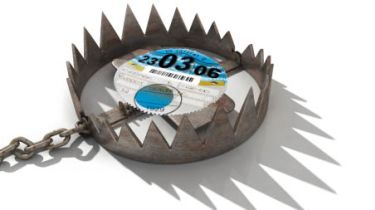Beware the Tax Trap
New emissions-based road tax rules are set to hit drivers hard – unless you buy carefully
Imagine two identical cars on a dealer’s forecourt. Both were registered in the same week in 2006 and are the same model, colour, spec and mileage. Yet one will cost at least £200 more to run every year until the day it’s scrapped. Which one are you going to choose?
It’s obvious. But this is the situation facing many buyers looking for a three-year-old used car, and few drivers have any idea of how to avoid falling into the tax disc trap.
Why? Because from 1 May, a year’s road tax on any vehicle registered before 23 March 2006 and emitting more than 225g/km of CO2 will cost £215. But owners of the same car registered on or after this date pay £405. In 2010, these figures will increase to £235 and £435 respectively – and they’re likely to keep on rising after that.
It’s all part of a Government plan to get motorists driving less polluting cars. The idea is that rising road tax bills will persuade you to swap your vehicle for something cleaner. But the changes have been delayed and messed around with to the extent that even trade experts are confused.
Most people assume – wrongly – that road tax on all ‘gas-guzzlers’ will rise sharply, and this is what ministers originally planned. But after a public outcry, they reversed the decision. So now, even the heaviest polluters registered before the March 2006 cut-off will stay in a lower band.
This fact has escaped many drivers and dealers – and that means it could be the time to pick up a real bargain before everyone else catches on. Anyone lucky enough to be able to afford a three-year-old Range Rover or Porsche 911 isn’t going to be put off by £405 for a year’s tax. But it’s not only these types of car that are affected.
For example, the original Audi TT had a 1.8-litre engine, but it still produces 226g/km – enough to put it in the higher band. Or if you have a family, and run a seven-seater, watch out for the Ford Galaxy 2.3 or Renault Espace 2.0T. Even the manual versions of these petrol cars sit in the higher category.
The same is true for the Hyundai Coupé 2.7-litre, Alfa Romeos with that characterful V6 or even the 2.0-litre Jaguar X-Type with an auto box. And these are just a few of the cars with similar problem ‘figures’.
If you’re in the market for any of these models, it’s crucial that you check the exact date of registration and the emissions level. This can be tricky, as most dealers will remove the tell-tale tax disc before putting the car on their forecourt.
As a rule of thumb, anything with a 55-plate will be fine, as it would have been registered before March 2006. If it has an 06-reg, it might still be okay – but you’ll need to check the V5 registration document to make sure it got its number plates screwed on before 23 March 2006. The V5 will also tell you the official CO2 figure.
If it’s the wrong side of that date, use it as a haggling tool to reduce the purchase price. Don’t just take into account the extra it will cost you in tax every year; also consider how future buyers will look at the car when you’re trying to sell it. In a few years’ time, a tax disc costing more than £400 a year might be half the vehicle’s value!
You should still be vigilant if you’re buying an older model. The CO2-based tax system only affects cars built after 1 March 2001, as emissions data before then wasn’t reliable. For vehicles made prior to this, engine size is key. From 1 May, everything below 1,549cc will be taxed at £125 a year, while cars above this – whether it’s a Mini or a Rolls-Royce – are charged £190.
This is good news for buyers considering older cars as future classics, but harsh on those wanting to save by running a frugal ‘banger’ – especially since most older diesels have engines bigger than 1,549cc!
Key Points To Remember
Check out the rules (using the web address below) and take a print-out with you when you visit a dealer. Being an expert will put you at an advantage, as most sellers don’t know what’s happening!
www.direct.gov.uk/en/Motoring/OwningAVehicle/HowToTaxYourVehicle/DG_172916
- If you need a big car, or just fancy a powerful model, choose a vehicle registered before 23 March 2006 or you’ll have to pay extra for road tax – and a year’s disc is almost certain to get more costly in the future.
- Buyers choosing a car registered on or after that date should use its higher tax as a haggling tool and get money off. Take into account the extra cost for each year you will own the vehicle, and the effect it will have on future resale values when you sell it on.
- If you want to save under the new rules, choose a low-emissions model registered after 1 March 2001. Cars used before this date have a flat rate tax based on their engine size, which could prove expensive.
- Alternatively, buy a pre-1973 classic or a zero-emissions (electric) vehicle and pay nothing for road tax! Just remember, they are not exempt from carrying a tax disc. You still have to get one to prove you have insurance and an MoT – it just doesn’t cost anything.



